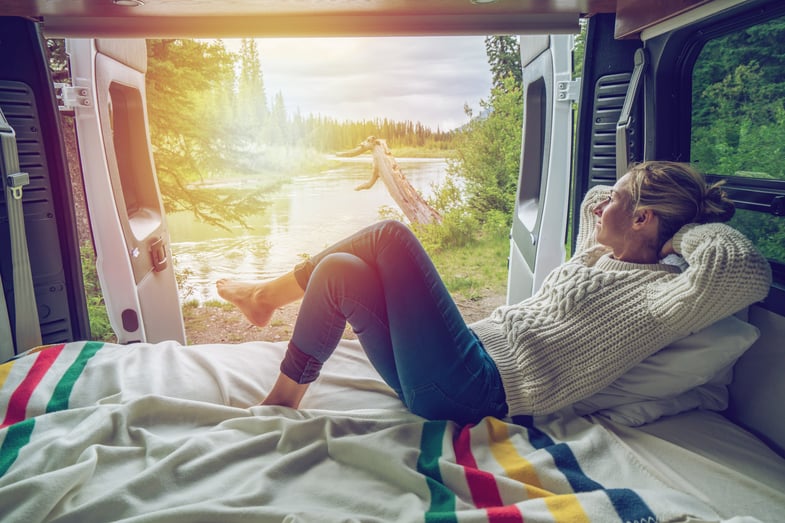 Welcome, brave traveler—so, you wanna live in a van, you say? You already spend your days literally saving lives in an intense and stressful environment, so how hard can van living be? Well, we’re glad you asked!
Welcome, brave traveler—so, you wanna live in a van, you say? You already spend your days literally saving lives in an intense and stressful environment, so how hard can van living be? Well, we’re glad you asked!
What Medical Travelers Like About Van Life
More and more people, including professional med travelers, are opting for a more nomadic lifestyle where they can keep their most treasured items and choose their own backyard. When you’re on the road about every 13 weeks, it might make sense for you to invest in a van or RV camper and hit the road.
How to make the most of your travel home
There are many mobile housing trends for medical travelers—RVs, vans, skoolies, and more. Regardless of what mobile unit works best for you and your situation, there are some things you should know before you officially take your home on your travel job:
- You’ve got the freedom and the power. Living a travel life gives you the unique opportunity to explore places you’ve always dreamed of, plus the freedom to do so on your own time and schedule.
- There are loads of lessons worth learning. Embrace a minimalist and simplistic lifestyle with fewer belongings. Pro tip: Keep things of value, whether it’s monetary or sentimental, hold onto it and ditch the non-essentials.
- Save some cash. As a professional medical traveler, you’re entitled to a tax-free government housing stipend. Typically, the stipend covers the cost of the lot and any other fees associated with your travel home.
- Meet new people and make friends. Since you’ll need to park overnight in an RV park or other lot, it gives you the chance to meet like-minded people and make friends that you may not have otherwise.
- The neater, the better. Because your tiny home is only so big, chores are a big part of your daily routine. From kitchen cleanup to changing greywater, there’s plenty of chores to be done.
- Prep your travel home for the ride. Make sure your mobile home is ready to take off—check your battery, check for any roof and exterior damage, fill the tires with air, test and clean appliances, and more.
Contrary to popular belief, you don’t have to exhaust your savings account to transform your van into a livable space. Travel nurses, Lindsey and Danny, can tell you all about it—they built out their van by themselves, and boy, they crushed it.
Travel nurse, Nate, also converted his van into a permanent home away from home. He said most of his loved ones thought he was “totally nuts,” but he was confident and determined to make it work. That life-changing choice has made his life as a travel nurse so much richer.
“The van has opened up so many more opportunities for solo travel,” Nate said. “As well as being more mobile and flexible to meet up with friends who want to travel.”
Take a peek at his hard work!
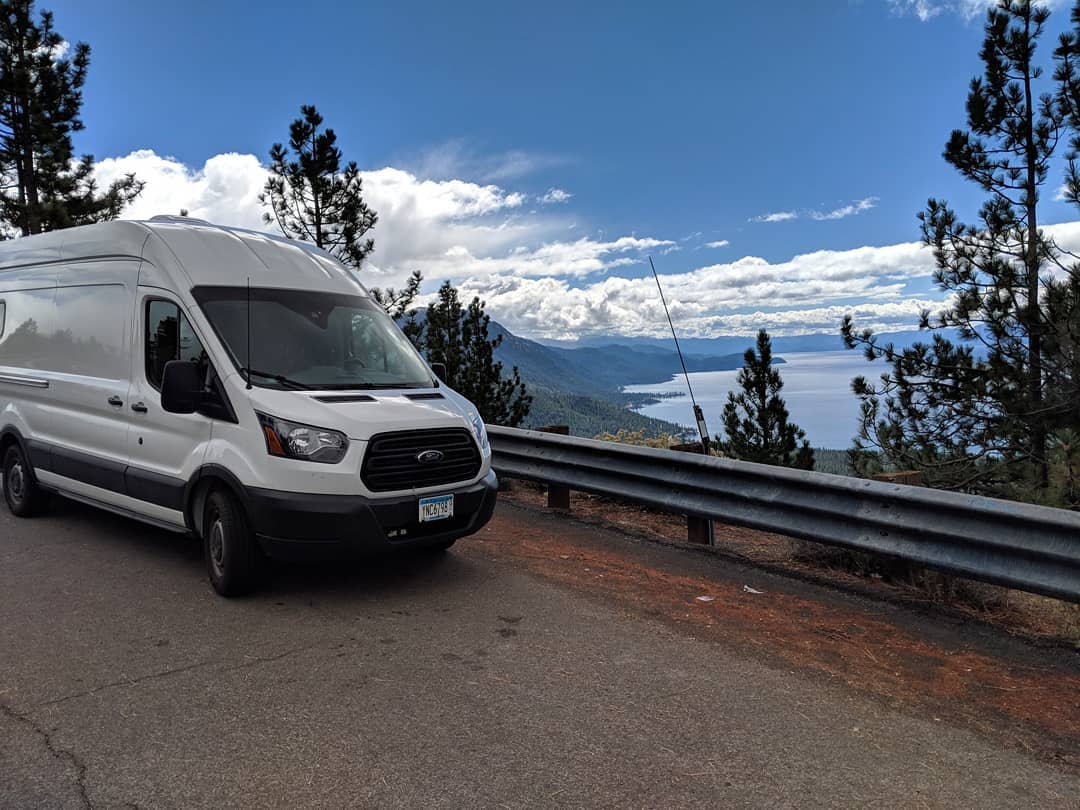
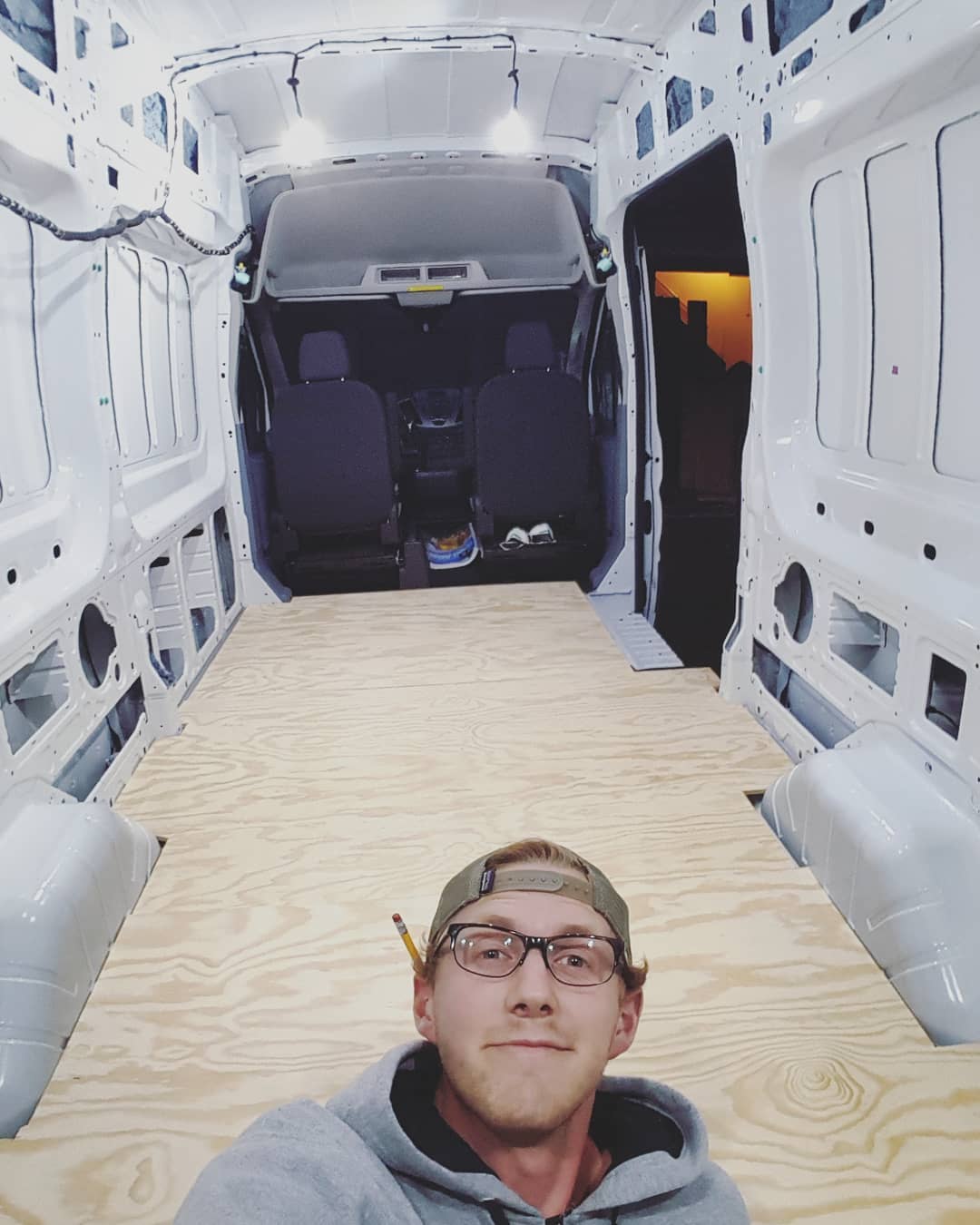
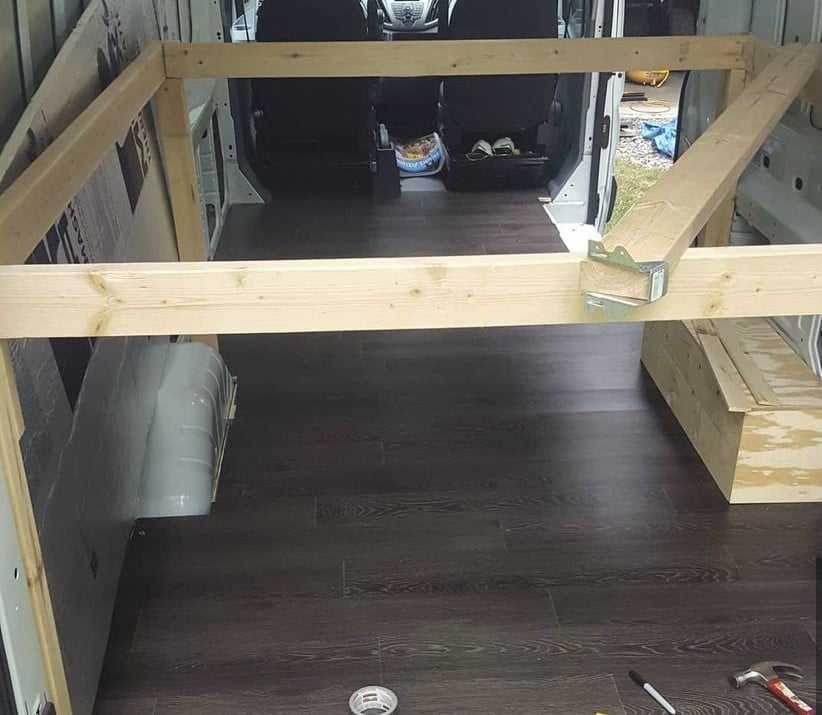
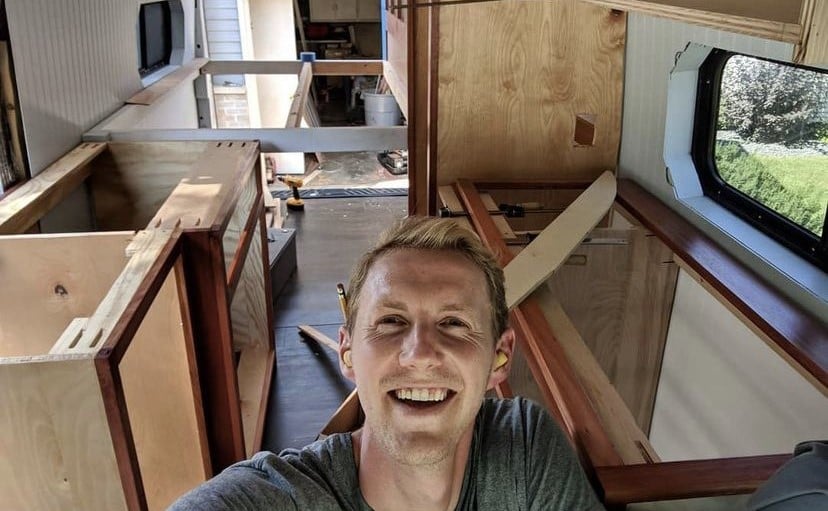
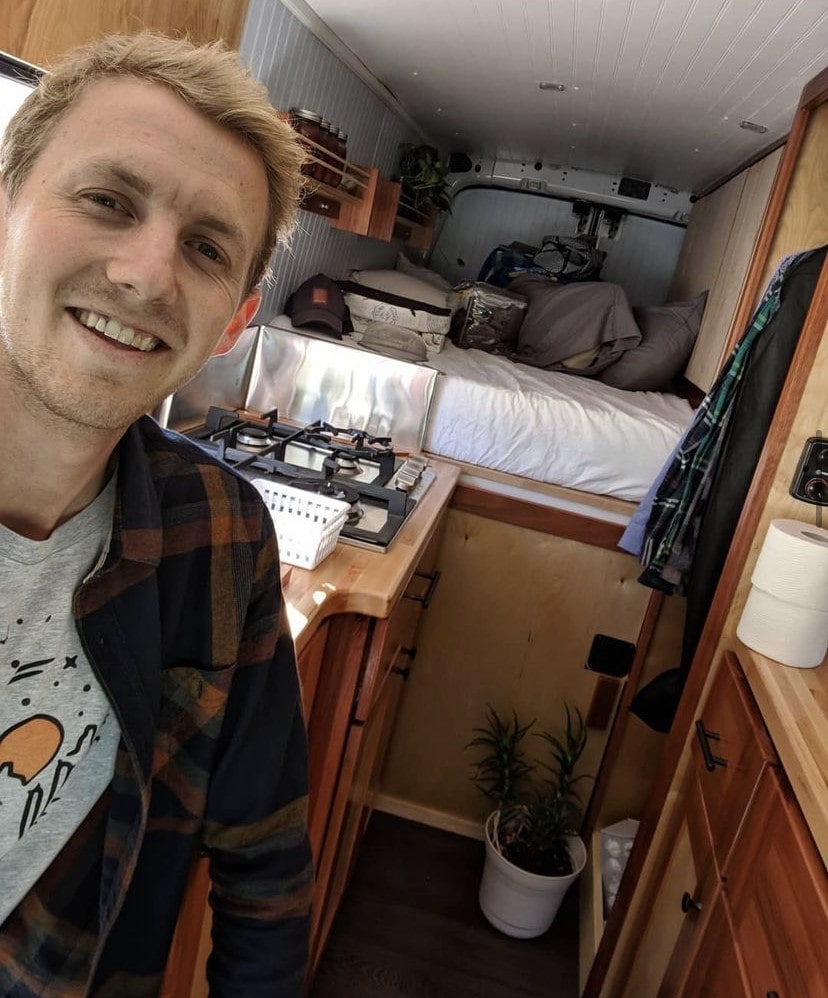
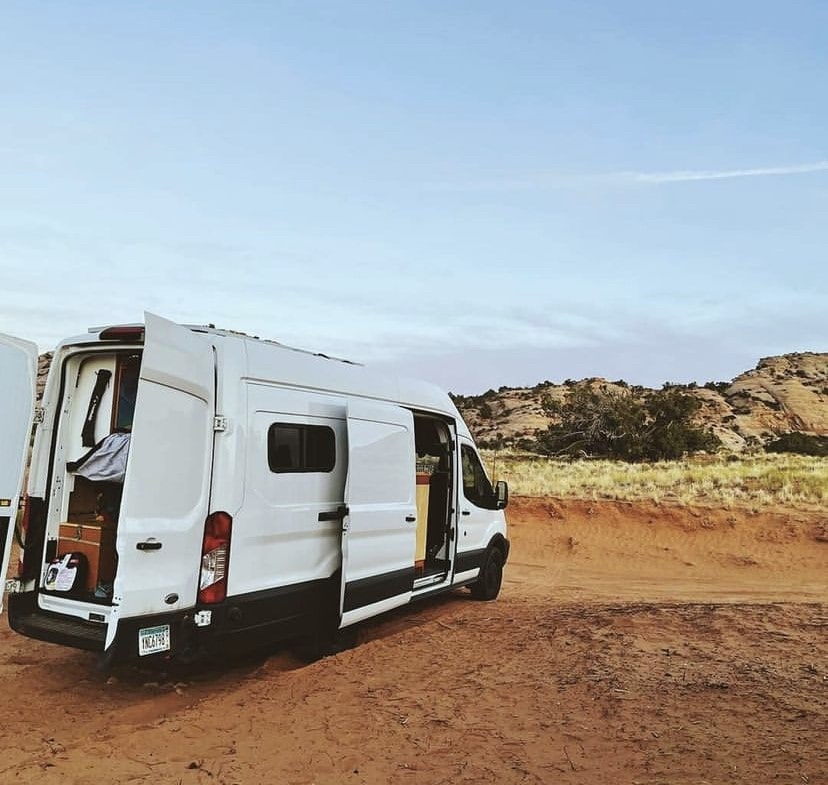
So, you wanna live in a van?
Lindsey, Danny, and Nate aren't the only ones who dig the van life. So, to gain some insight knowledge, we asked our Fusion med travelers what they like about living a mobile lifestyle. Here's what they said:
- "I like not having to pack and unpack all the time," med traveler, Allison, said. "I can just pick up and go!"
- "It's great to not have to struggle to find housing," said Alexander. "And lots are cheaper than a monthly rent on a house."
- "I love that it always feels like home no matter where I'm parked," said traveler, Amanda.
- "It means you take your house with you," said Gerda. "It means housing isn't a problem and it means you get to take your pet with you without a pet deposit!"
- "I love having my own space and making it feel like home!" Said Christina.
- "It's my space wherever I go," said travel nurse, Matt. "A lot rent is generally less expensive than apartment or house rent and definitely less than hotel rooms."
- "I love the fact that your home can go with you anywhere you go!" Said Tina. It's something you own, not rent, and has a constantly changing yard and scenery. It also allows you to take your pets with you. And there's nothing better than your own pots, pans, bed, towels, etc.!"
- "It's my own house, just a smaller version," said Janeece. "Comforts of home are priceless, plus I can have my animals with me and not have to worry about it."
Q&A with motor travelers (feat. Marsha Campbell-Klaschen, CNA and Brandian Liestman, RN)
Like anything, mobile living comes with perks and pitfalls. We talked with a couple Fusion motor travelers, Marsha and Brandian, to learn what it takes to live in a mobile home unit.
Megan Bebout: Why did you choose the mobile travel life?
Marsha Campbell-Klaschen: I love the outdoors. Sitting around a campfire at night is very relaxing to me. Being out in nature is wonderful. When I'm not working, I can go on a hike. Also, my husband just retired and will becoming along with me at times. We just love the atmosphere. We have been campers for 25 years and it's just a lifestyle we like. It's my own home away from home!
Brandian Liestman: For all the perks, the ability to take a contract in the same city as my grandchildren or my father and not have to intrude, or have the grandkids stay overnight, and be able to take all the comforts of home with us. I never have to decide what I have to leave at home because it won’t fit in the truck. The cost comparison between hotel and restaurants vs truck, camper, insurance was huge with the stipends paying all of the payments, insurance, and lot rent while providing all of the perks. I do pay more than what the travel allowance is to get to a location but the convenience of having my own space is well worth it.
MB: How has your mobile life impacted your medical career?
MCK: It gives me my space, so it helps with my sanity and my inner peace. I'm surrounded by things that are mine. I can literally clean my camper in under 30 minutes and have time to do what I want on my days off!
BL: I have been able to visit family, spend more time with my husband, take contracts that have been all over the country, and have reduced the amount of stress that I felt as a staff nurse. I have met amazing people, both patients and coworkers, without having to deal with the politics of hospital policies and never feel stuck in a “job.” My physical and emotional health are better, and I have a new level of understanding and patience for the people I interact with on a daily basis. I feel like I have become a better nurse, have more diversity and a larger skill set than I was able to develop as a staff nurse.
MB: What are the perks of a mobile travel lifestyle?
MCK: For me, it is being able to bring a piece of home with me. I love the fact that when I get home from my shift, I'm in my own place with my favorite things. I can still make meals that I love to make, or even order out for delivery. It's decorated in my taste and has my comfort items. Like my own sheets, pillows, blankets, and pictures of my family. I don't have to worry about someone coming in and cleaning and moving my things. Plus, meeting new campers from all over the United States. Some you'll get along with right off the bat. You'll feel like you've known them forever. And you will stay in touch. Others you just learn to be short and sweet and move on from them.
BL: I get to feel like I am home even when I am on assignment. I have my own bed, kitchen, furniture, etc. I never have to pack into suitcases and worry that I may not have everything I will need to be away from home for 3 months. I have been able to continue with my hobbies—sewing, baking, and crafting—without trying to fit everything into moveable totes and packing in and out of hotel rooms. I have the privacy of home, never having to worry about renting a room and the landlords scamming me for rent or stealing while I am at work or not knowing who is in and out to clean etc. while in a hotel. I have control of my safety knowing that nobody else has a key and can enter whenever they want. I am able to keep my dogs with me at all times and don’t have to worry about extra costs of pet deposits, and my husband is able to come with me since we have our own space. It has become less expensive to rent a lot to park a vehicle with power, sewer, and water connections and be able to cook than to rent and eat out as housing has become more expensive and less available. I am able to stay anywhere without connections due to having water storage tanks, propane, battery backup and generator so I can choose and start an assignment without having to locate housing before traveling.
MB: What are some challenges?
MCK: Well to be honest, it isn't fun to have your sewer get clogged up. You have to learn what types of toilet paper you can use. Because let's be honest, RV toilet paper at $4.99 for 4 rolls isn't budget friendly. You want something that will dissolve and break down. You still add a solution to your tank to help break stuff up.
There's a lot to learn about what to do and not do. You just have to do a lot of research and ask questions to other campers. We learn something new every trip!
Finding someone to work on your AC if a wire gets loose and replacing your appliances if on assignment in your camper—these are all things you might have to worry about. Definitely finding places to stay in the summer of high traffic vacation destination can be a challenge, along with it being in the budget. Because of some of their prices for peak seasons and after you do the math, it is just more cost effective to go with renting a housing unit or hotel room. It's hard to plan too far ahead when you aren't 100 percent sure where you are going to get your next contract. So far, I've been very fortunate enough to find spots. I was very concerned with taking a contract for the summer because it's a vacation destination. But with asking my prospective interviewer if she knew any local places that rent to medical travelers, she helped me out big time!
BL: I am unable to park the truck in a normal size parking space. The truck that we tow the fifth wheel with is also our daily driver and the length is the same as a tractor trailer so parking takes two or three spaces and that is not always available in a city, so my husband has to drive me to and from work. Driving in city traffic with the fifth wheel attached can be difficult and stressful.
MB: What advice would you offer travelers considering a mobile unit?
MCK: Start off with what you can afford! The lifestyle might not be what you like. But give it a good try and don’t stress about it.
BL: Learn basic maintenance: brake pads, checking vehicle fluids, belts, and pullies. Most of these can be done fairly quickly and less expensive yourself. Tires and alignments are important since you live on your tires and the money you spend will save you from expensive side of the road towing or repairs from blowouts that damage the camper or truck.
Always have a backup plan. If you are heading out for a contract and you break down, make sure you have a plan to get there. Find the travel sites on Facebook or on local area add sites and join—there is always someone that has dealt with what you are dealing with. Use local ads to find private land you can park on.
The fridge will always have things that move around while driving so open it slowly after stopping. Wrap your glass dishes etc. (or use metal and plastic) and don’t get attached to it or it will break. Have a backup generator, propane tanks, and batteries to power the camper just in case.
We know #VanLife isn’t for everybody. Lucky for you, there are other mobile home options from travel RVs to skoolies, you can take your home—whatever that may look like—with you where you go. Experience the thrill of exploring new destinations in your mobile home as you travel from one travel medical assignment to another, plus enjoy the convenience of never having to pack or unpack your belongings.





